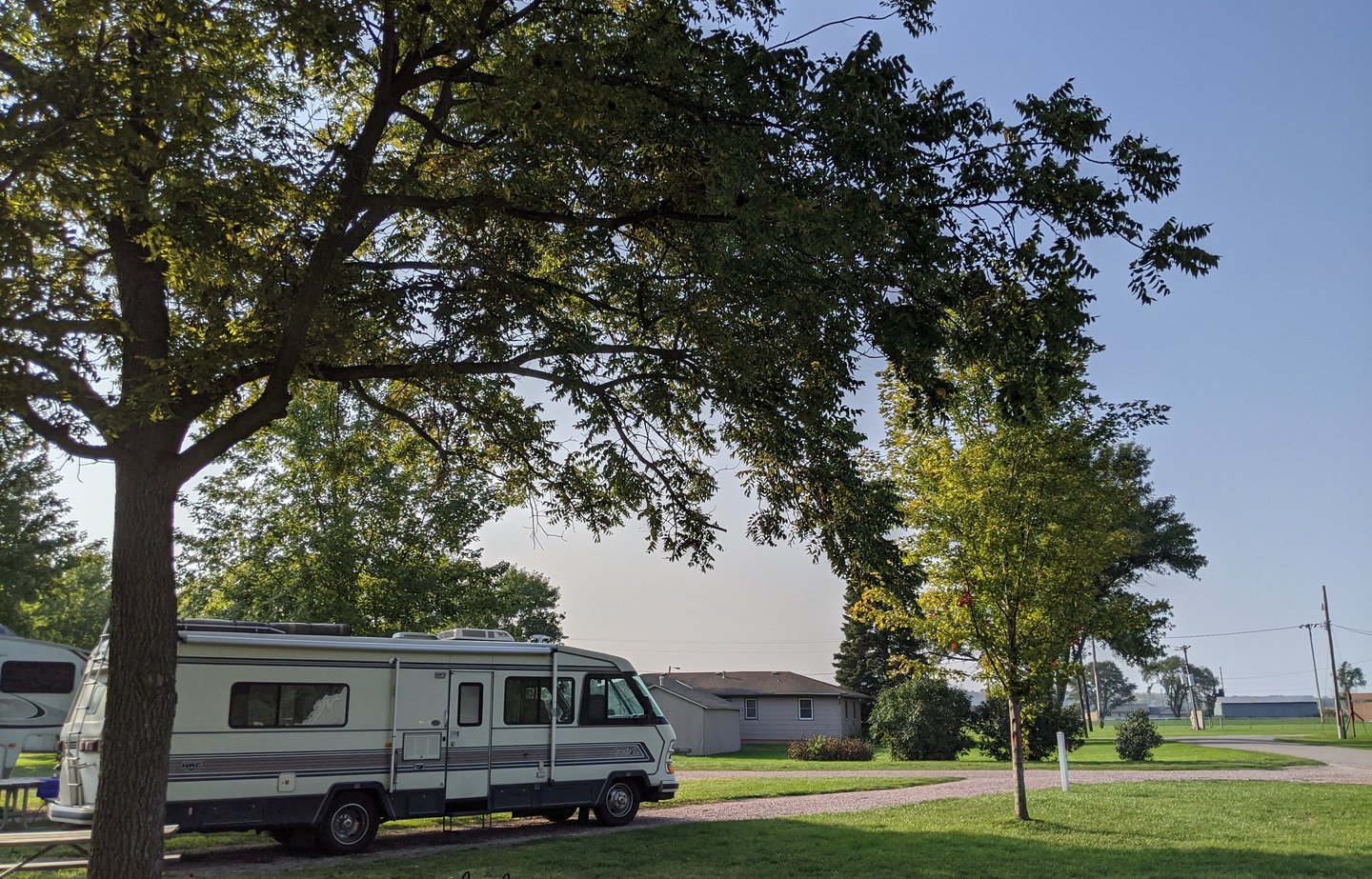It’s Day 504. September 21, 2020. And we are in Decatur, Nebraska.
Podcast episode #90 Transcript
Dougie, Billie, and Craig
9/21/20207 min read


It’s Day 504. September 21, 2020. And we are in Decatur, Nebraska.
As we pulled out of Spirit Lake this morning, I couldn't help but feel a sense of excitement mixed with a bit of apprehension. The subtle chill in the air reminded me of the changing seasons and the adventures that lay ahead. It was a perfect day for a road trip, and heading south felt like the right direction.
And with Iowa's great lakes region in our rearview...we continued winding our way through the rolling farmland of northwestern Iowa...Driving south on US 71.....passing the endless fields of corn and soybeans....looked just like what we had seen coming into Spirit Lake...highlighting the fact that Iowa's Great Lake Region really is a pretty cool outdoor oasis smack dab in the middle of American farmland.
Crossing into Nebraska, I was struck by the openness of the land. The rolling hills gave way to vast stretches of farmland, and then... the Missouri River came into view, rolling past as slow and steady as it has been every time we've crossed its path.
It reminded me of all that time spent along it's banks back in Craig Montana...and feeling a deep connection to the history and beauty of this river...and the places it rolls through.
And then...barely 100 miles from where we had started the day...we found....Decatur—a small town with big roots. I'd quickly learn that this little town has watched history unfold....first....an area of the country that spent millions of years as part of a massive inland sea. Here...as the waters receded....leaving behind the rich soils and rolling plains that now define Nebraska.....
Then...An Ice Age....would take it's turn on the landscape...carving in valleys....depositing Loess soil....and shaping the path of what would become one of the most important rivers in North America...The Missouri river. The same river that would one day bring explorers, settlers, and commerce to what we now call Decatur.....a town of persistence, change, and survival
First inhabitants.....the Omaha tribe. They thrived here, utilizing the river for trade, food, and transportation. Their culture was rich, their society organized.....and their connection to the land..... deep.
When Lewis and Clark passed through in 1804, they encountered these indigenous people, who had already established trade networks that spanned hundreds of miles
And then.....Fast forward to 1806—When Fontenelle’s Post was established near the Missouri River. Named after Lucien Fontenelle, a fur trader of French descent, this post became a hub for trappers and merchants. But as Omaha expanded, absorbing many of these early trading posts, settlers moved further north, and in 1856, Decatur was officially founded.
Reading the name Fontenelle brought back memories of our time in Fontenelle, Wyoming, on the banks of the reservoir by the same name. I remember thinking there must be a connection, and indeed there was. It was fascinating to learn that the area in Wyoming was named for Lucien's son, Logan Fontenelle. It felt like a small piece of history connecting our journey across states...
Back here in Nebraska....Decatur would be named after Stephen Decatur, a hero of the War of 1812, the town was built with a promise—the promise of opportunity, commerce, and connection to the greater Midwest. And it delivered, for a time. The river provided transportation, rich soil made for excellent farming, and soon, a growing population was calling Decatur home.
In the late 19th and early 20th centuries, Decatur thrived. Agriculture was king, and the town’s proximity to the river meant easy transport of goods. Steamboats carried grain, livestock, and supplies up and down the Missouri. As the railroads expanded westward, they, too, played a role in Decatur’s economy, bringing more settlers and trade.
But then....the story of small town America kicks in....and like many small towns....Decatur faced challenges. The rise of larger cities, changes in transportation, and shifts in industry meant that it never became the booming metropolis some had envisioned. Yet, it persisted.
Today, with a population hovering around 400, Decatur remains, not as a relic of the past but as a testament to endurance. Farming is still a way of life, but tourism, outdoor recreation, and a slower pace of living have become defining characteristics of this town.
And that Force of Nature....The Missouri River has always been Decatur’s lifeblood. It dictated the town’s location, fueled its economy, and shaped its identity. But it has also been unpredictable. Floods have tested Decatur’s resilience time and again. As recently as 2011.. historic flooding left parts of the town underwater, forcing evacuations and reshaping the landscape. Yet, the town rebuilt, just as it always has.
The town is also known for providing some of the best views of the Missouri River...anywhere. And I'm pretty sure we found one of them....in the form of the Beck Memorial Park Campground. We'd spend our first night parked in a spot near the entrance to the park....but as soon as one of those prime spots down on the river opened up....we were there...camp all set up and ready to hang out on the banks of the Missouri for a few days.
Not sure if this is still called Indian Summer.....Dog Days of summer.....or just "Fall"....but whatever it's called....we'll take it. Weather couldn't have been better....long walks along the river...exploring the town....even an afternoon spent watching the countless boats launched...and then drug back out of the river at the public boat launch just below us....clearly....we'd found a popular spot.
As we watched all the activity on the Missouri River, I felt a difference in its personality here in Nebraska compared to our time on its banks in Montana. In Montana, it felt shallower, with fishermen in hip waders and small fishing craft everywhere. Here, it felt bigger, deeper, and faster-moving, attracting boats of all sorts throughout the day. It was a reminder of how the same river can have different characteristics depending on where you are
And all that time.....walking alongside....or just staring out over this Missouri River....it gives a guy plenty of time to think through things. Your brain, or mine anyways, latches onto something and begins to break it down, analyze, imagine, and wonder why we react to things the way, and when we do…
I hadn't thought much about the pandemic over the past few stops, mostly on purpose, realizing how lucky we are to be out here in the wide open. No masks, no worry of social distancing, not being inundated with terms like ventilators and death tolls. It was a stark contrast to the reality many were facing, and it made me appreciate the freedom and peace we had found on this journey.
Decatur had been yet one more example of a town...that just seemed quiet....but otherwise uneffected by it all....or did the quietness....mean exactly the opposite....Turning on the news for the first time in days....I wondered....had the tragedy of it all began to subside....was it maybe even going away....I'd quickly learn that wasn't the case (Insert Video)...
So yea....not goin away....
Looking back over this thing....as I've done a couple times in recent months.....something else is becoming clear to me...And that's exactly how differently countries have handled the last 8 or 9 months....some....like South Korea...New Zealand....Austria.....pretty dang effective, while others struggled to contain the outbreak...and as each day passes....it becomes more and more clear....where the US has landed on this.
I kinda approach challenges with a....lets say.... healthy dose of skepticism—always asking, “What could go wrong?” This mindset isn’t about being negative; it’s about being prepared....because in a crisis, preparation is everything.
I went back again....to what we knew..... and when we knew it.
According to most every news outlet out there... the first documented case of COVID-19...was in Wuhan China last November.....and for the most part....China's first instinct it seems was to keep things under wraps and contain....but by last Christmas...it had become clear...in medical and science communities alike....that the world was headed towards a full blown pandemic.
By January 2020, the world was beginning to take notice. On January 11, China reported its first COVID-related death. By January 20, both the U.S. and South Korea confirmed their first cases of the virus. The South Korean government responded swiftly, activating a task force as early as January 3. Meanwhile, in the U.S., an emergency was not declared until January 31. By that time, the virus had already spread significantly.
On February 11, BBC News published that article titled “Coronavirus: China and the Virus That Threatens Everything,” detailing the strain on China’s healthcare system and the extensive isolation measures being implemented. The warning signs were there. The data was available. The question...for me became....why would nations respond so differently?
I started comparing the responses between S Korea...and the US.
Both nations confirmed their first cases on the same day—January 20, 2020. But from there...but from there....dramatic differences in strategy.
South Korea took immediate action, launching extensive testing, contact tracing, and a national communication campaign. By early April, they had conducted widespread testing and implemented aggressive containment measures. And it's pretty clear...to me anyways...that their strategy worked...to date... South Korea has reported just 23,889 total cases and 415 deaths.
Meanwhile, the U.S. faced delays in testing, inconsistent messaging, and fragmented response coordination. And the result? to date....the U.S. had surpassed 6 million cases and recorded over 180,000 deaths.
Accountability is a cornerstone of effective governance. While placing blame isn’t the goal, understanding where things went wrong is crucial.
I say that because....I see two areas of accountability here....that stand out
First—government leadership. At almost every level, the response revealed gaps in preparedness, coordination, and transparency. A well-functioning system should act decisively in a crisis, not react slowly due to political or bureaucratic hurdles.
Second—public communication. In a pandemic, clear and consistent messaging saves lives. South Korea demonstrated how transparency and public trust can lead to effective containment. In contrast, the U.S. response has often felt disjointed, with mixed messages causing confusion and delays....and inaction. As I write this...there are still fellow Americans that don't even believe....the pandemic is real. How do we help them?
I mean.....The numbers speak for themselves.
South Korea.... less than 24,000 total cases and 415 deaths...thats....roughly 0.0008% of their population.... lost to COVID-19.
And here.....over 6 million cases and more than 180,000 deaths— that is 0.054% of the population...that's like....400 times higher than S Korea....
At the very least....this pandemic....has exposed vulnerabilities....but at the same time....it's also given us a chance to learn, adapt, and be better prepared for the future.
I also feel like there's another big lesson here....on the type of person...the kind of human..... you want at the helm...in charge of things...when faced with a crisis.
Hard to read thru this stuff without makin my brain tired....it was time to close the laptop....and another walk along that Missouri River with Dougie.
Reflecting on our stop in Decatur....the walks along its quiet streets...Looking at that river....and realizing....that just like most everywhere....history isn't just remembered...it’s still being made..
